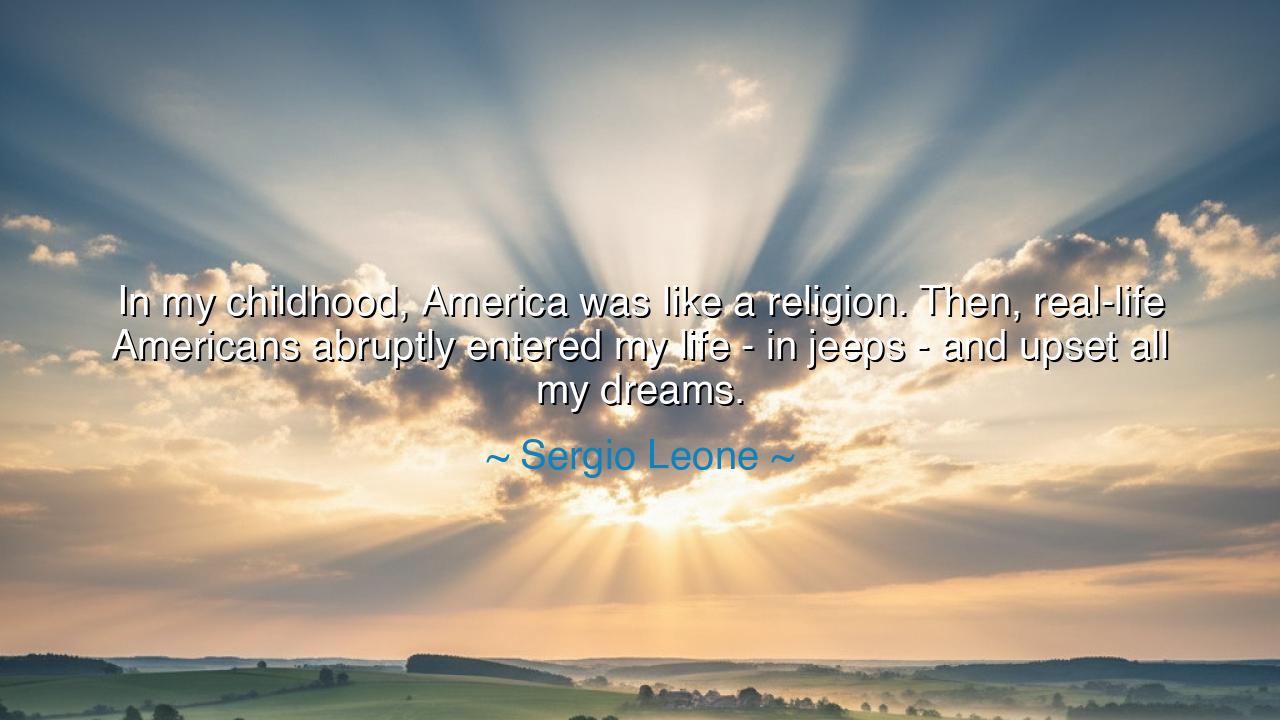
In my childhood, America was like a religion. Then, real-life
In my childhood, America was like a religion. Then, real-life Americans abruptly entered my life - in jeeps - and upset all my dreams.






In the twilight between dream and disillusionment, the great Italian filmmaker Sergio Leone once spoke these haunting words: “In my childhood, America was like a religion. Then, real-life Americans abruptly entered my life — in jeeps — and upset all my dreams.” In this confession lies both wonder and sorrow — the cry of a man who had worshipped an idea, only to find the reality imperfect. It is the eternal story of humanity’s search for the ideal: the vision of paradise, shattered upon contact with the flawed hands of mortals.
The origin of this quote lies in Leone’s youth, in Italy during and after the Second World War. As a child, he looked to America as one might look to Olympus — a shining land of freedom, power, and moral clarity. To him and to many across Europe, it was the embodiment of hope itself: the land of cowboys and heroes, of vast skies and righteous victories. America was not merely a country; it was an idea, a religion, a symbol of perfection that seemed to stand above the ruins of a war-torn world. But when the American soldiers arrived in Italy — the “jeeps” of his memory — the illusion fractured. He saw not gods but men: weary, flawed, human. They were no longer the mythic figures of his imagination, but ordinary beings caught in the machinery of power and necessity.
Thus, Leone’s words are not an indictment of America, but a revelation about idealism itself. For every soul that worships an image — of a nation, a hero, a dream — must one day face the moment when the image crumbles. What was perfect in the mind becomes imperfect in the world. This is not tragedy, but awakening. In that instant, we learn that what we revered was not the thing itself, but our own yearning for something higher. America, in Leone’s story, becomes a mirror for the human spirit — forever seeking purity, forever discovering imperfection.
History offers countless echoes of this truth. When Christopher Columbus set sail toward what he believed to be a new Eden, he too was driven by dream and discovery. Yet what he found was not paradise, but complexity — a world that did not fit the image he carried within. The same could be said of the revolutionaries who, centuries later, fought to build republics of liberty, only to confront the imperfections of their own creation. It is the curse and the blessing of humanity that the dream is always purer than the world that tries to contain it.
For Leone, this revelation became the seed of his art. In his films — from The Good, the Bad and the Ugly to Once Upon a Time in America — he peeled away the myth of the American West and exposed its soul: beautiful yet brutal, noble yet corrupt. He showed that beneath every legend lies contradiction, that even the greatest ideals are carried forward by imperfect men. His childhood faith in America was not destroyed — it was transformed. What began as religion became understanding; what began as worship became wisdom.
And what is the wisdom we are meant to draw from his words? That the world will always disappoint the idealist, but that disappointment itself is sacred. It is the moment when the dream, stripped of illusion, reveals its true power — not as fantasy, but as guide. The wise do not abandon their dreams when they meet imperfection; they refine them. The flame of idealism must burn through the smoke of reality without being extinguished. In this way, the soul matures — not by losing faith, but by learning to love truth more deeply than illusion.
So let this teaching be passed down: revere ideals, but do not idolize them. See every nation, every hero, every dream for what it is — both divine and human. When your vision meets the dust of the earth, do not despair; it is the meeting of heaven and soil that creates life. Like Sergio Leone, take the broken pieces of your dream and build from them something truer — art, wisdom, compassion. For only those who have seen the fall of their idols can understand what it means to stand as a creator in the world: one who no longer worships perfection, but transforms imperfection into beauty.
Thus spoke the dreamer who became a truth-teller. His words remind us that the gods we imagine are but reflections of our own hope — and that when those gods fall, we are called not to mourn, but to rise, wiser and freer, in the eternal pursuit of what is real.






AAdministratorAdministrator
Welcome, honored guests. Please leave a comment, we will respond soon